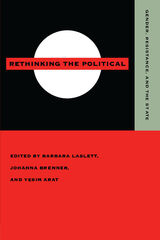5 books about Laslett, Barbara

Feminist Sociology
Life Histories of a Movement
Thorne, Barrie
Rutgers University Press, 1997
This collection of thirteen life stories recaptures the history of a political and intellectual movement that created feminist sociology as a field of inquiry. As the editors' introduction notes, the life history is a crucial tool for sociological thought. Life histories can be a bridge between individual experience and codified knowledge, between human agency and social structure. Life histories can enhance social theory by revealing categories of meaning usually submerged in the conventions of social science. The authors in this volume, all sociologists who have had great impact upon the field in which they write, show how personal relationships, experiences of inequality, and professional conflict and camaraderie interweave with the formation of social theory, political movements, and intellectual thought. The book makes a powerful impression upon anyone who has struggled with the relationship between social theory and everyday life. -- Accessible, lively articles that combine personal narrative with sociological theory. -- Contributors are some of the leading voices in feminist sociology.
[more]

Gender and Scientific Authority
Edited by Barbara Laslett, Sally Gregory Kohlstedt, Helen Longino, and Evelynn Hammonds
University of Chicago Press, 1996
This volume of recent Signs articles offers some of the most significant contributions to the debates on history and theory. Illustrating the uses of theories in recent feminist historical research and the often contentious arguments that surround them, the articles speak to a number of discussions, including the theoretical tradition of political economy, the importance of class relations for understanding historical events and social relationships, and the expansion of concepts from political economy to include race. Included as well are the workings of gender signification in terms of the body, moving it from its traditionally lesser position in the hierarchical Enlightenment mind/body split. A further group of articles concerns the discursive character of power relations and the dialogic quality of language. The volume will be extremely useful for feminist historians in a variety of disciplines as well as women's studies students interested in issues of interdisciplinarity.
[more]

History and Theory
Feminist Research, Debates, Contestations
Edited by Barbara Laslett, Ruth-Ellen Boetcher Joeres, Mary Jo Maynes, Evelyn Brooks Higginbotham
University of Chicago Press, 1997
This volume of recent Signs articles offers a number of significant contributions to feminist debates on history and theory. It illustrates the uses of theories in recent feminist historical research and the often contentious arguments that surround them. The readings are organized into three sections. The first draws on the tradition of political economy, and discusses the importance of class relations for understanding historical events and social relationships and the expansion of concepts of political economy to include race. The second section, on "The Body," demonstrates how feminist scholars have increasingly worked to re-place the body, to move it from its traditionally less valued position in the hierarchal Enlightenment mind/body split to an approach that emphasizes the body as both material and discursive, both "real" and "representational." The final section, "Discourse," focuses on an examination of the productive power of language in both reflecting and shaping experience and in the contestation of social relations of power.
[more]

Rethinking the Political
Gender, Resistance, and the State
Edited by Barbara Laslett, Johanna Brenner, and Yesim Arat
University of Chicago Press, 1995
This collection of eighteen articles shows how conceptions of the political are expanded and revised when viewed through the lens of gender. Carefully organized to serve scholars and students across the social sciences, this book reexamines such basic notions as citizenship, collectivity, political resistance, and the state, drawing on examples with important historical and national variations.
Section One, "Gender, Citizenship, and Collectivity," includes Nancy Frazer and Linda Gordon's critique of dependency and citizenship; Iris Young on women as a social collective; Ruth Bloch on the feminization of public virtue in revolutionary America; Trisha Franzen on feminism and lesbian community, and Sonia Kruks on de Beauvoir and contemporary feminism.
"Collective Action and Women's Resistance," Section Two, features Louis Tilly's "Paths of Proletarianization"; Temma Kaplan's "Female Consciousness and Collective Action"; and five assessments of women's collective action worldwide: Samira Haj on Palestine, Arlene McLeod on Egypt, Gay Seidman on South Africa, Nancy Sternbach et al. on Latin America, and Anne Walthall on Japan.
Concluding with a section on gender and the state, Rethinking the Political also features Bronwyn Winter on the law and cultural relativism; Sherene Razack on sexual violence; Wendy Luttrell on educational institutions; Patricia Stamp on ethnic conflict in postcolonial Kenya; Elizabeth Schmidt on patriarchy and capitalism in Zimbabwe; and Muriel Nazzari on the "woman question" in post-revolutionary Cuba.
Section One, "Gender, Citizenship, and Collectivity," includes Nancy Frazer and Linda Gordon's critique of dependency and citizenship; Iris Young on women as a social collective; Ruth Bloch on the feminization of public virtue in revolutionary America; Trisha Franzen on feminism and lesbian community, and Sonia Kruks on de Beauvoir and contemporary feminism.
"Collective Action and Women's Resistance," Section Two, features Louis Tilly's "Paths of Proletarianization"; Temma Kaplan's "Female Consciousness and Collective Action"; and five assessments of women's collective action worldwide: Samira Haj on Palestine, Arlene McLeod on Egypt, Gay Seidman on South Africa, Nancy Sternbach et al. on Latin America, and Anne Walthall on Japan.
Concluding with a section on gender and the state, Rethinking the Political also features Bronwyn Winter on the law and cultural relativism; Sherene Razack on sexual violence; Wendy Luttrell on educational institutions; Patricia Stamp on ethnic conflict in postcolonial Kenya; Elizabeth Schmidt on patriarchy and capitalism in Zimbabwe; and Muriel Nazzari on the "woman question" in post-revolutionary Cuba.
[more]

The Second Signs Reader
Feminist Scholarship, 1983-1996
Edited by Ruth-Ellen Boetcher Joeres and Barbara Laslett
University of Chicago Press, 1996
READERS
Browse our collection.
PUBLISHERS
See BiblioVault's publisher services.
STUDENT SERVICES
Files for college accessibility offices.
UChicago Accessibility Resources
home | accessibility | search | about | contact us
BiblioVault ® 2001 - 2024
The University of Chicago Press









